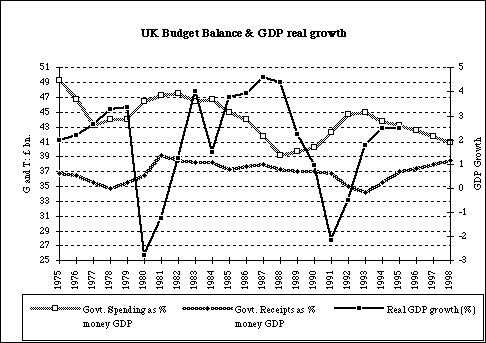How Big (or
small)
should the Budget defict be?
We have already seen that equilibrium in the
circular
flow of income does not require that the government should
balance
the budget (set G = T) necessarily. However, if it choses to run a
deficit
with G > T (as has been the typical pattern of government policy in
the
UK and many other countries), then the implication of the circular flow
of income is that there must be offsetting 'imbalances' in either or
both
of the BoP current account (X - IM) or the domestic capital market (S -
I) since S + T + IM must equal I + G + X for an equilibrium.
For instance, in a major depression, I is less
than
S, in which case a budget deficit (G greater than T) can result in the
excess of savings over investment being "mopped up" by the government
(borrowing
this excess of savings to fund the budget deficit). This is the
essence
of the Keynesian policy for recovery from the 1930s Great Depression,
when investment fell because of the general negative sentiments
following the stock-market crash, and savings increased as people
feared growing unemployment and falling incomes.
In practice, a considerable fraction of
Government
Spending and Taxation is now closely linked with national income - via
automatic
stabilisers. G grows as Y declines (economy in recession),
due
especially to unemployment and social security spending - see chart
below.
Taxes should increase as Y increases, and fall as Y falls (as has been
the case since 1990, with a lag - taxes are paid in arrears).
This
relationship, however, did not hold in the 1980/81 depression, because
the Government (under Mrs. Thatcher) was actually increasing tax rates
at this time to slow the economy down and reduce the (substantial)
inflation
at the time.
If G goes up and T goes down during a recesssion,
then the Budget is likely to be in deficit during recessions, and will
only be in balance or surplus during the booms (as in 2001 - with a
substantial budget surplus because of increased tax revenues, as well
as
rather restricted government spending).

Thus, government deficits are not necessarily
always
all bad. "Forcing the budget to balance every year is bad economics" -
the Economist, 12.2.1994 - Economic Focus, p 79. Counter- cyclical
budget
deficits (surpluses) can help prevent economies getting stuck in
recession
or generating serious inflation.
This idea leads to the suggestion that budget
deficits
should be "adjusted" for the state of the economy compared with full
employment
- ie for the stage in the 'business cycle'. Thus, although the budget
deficit
for the UK was between 5 and 6% of GDP in 1995/6, if this is Cyclically
adjusted the figure was more like 3% of GDP - as an estimate of
the
size of the deficit if the economy were at full employment
rather
than being at less than full capacity.
Does this mean that, over the full cycle, the
budget
should balance (G = T over the full cycle)? Or should it be
allowed
to be in continual deficit, with G > T, so that the government can
provide
the services and investments the electorates require?
The question of how big budget deficits should be
depends on the answers to two further questions:
- Is the deficit (which increases total public
debt) being
used to build up national public capital (investment in Health,
Education,
Transport, Communications etc.)
- Can the build up of public debt be
tolerated,
and more
importantly, serviced in the future (ie can we afford to pay the
interest
of the increased levels of public debt)?
As the current statement of Government Policy says: "These objectives
are
embodied in the present Government's two fiscal rules, against which
the
performance of fiscal policy can be judged:
- the golden rule: over the economic cycle, the Government
will
borrow
only to invest and not to fund current spending. It is met
when,
over the economic cycle, the current budget is in balance or
surplus;
and
- the sustainable investment rule: public sector net debt
as a
proportion
of GDP will be held over the economic cycle at a stable and prudent
level.
Other things equal, a reduction in public sector net debt to below 40
per
cent of GDP over the economic cycle is desirable." (Though why 40% is such a 'magic' number
remains unclear)
These fiscal rules clarify the real nature of the
issues:
- The key problem with the Golden Rule - only
borrow for
capital spending - is to identify capital spending: which
parts of government spending count as current and which as capital or
investment
- for instance, what is a new building and equipment for the Department
of Social Security? what is increased spending on education or
health?
The government
statement goes on to define capital spending as "growth enhancing"
but this, too, is far from unambiguous.
- The major issue under the Sustainable Investment Rule is why
40% is
a critical level for public debt. Italy's net
public
debt has been as high as 110% of GDP, the US's is about 40%. But,
if capital spending is really growth enhancing, then presumably a
higher
debt ratio now can be justified on the grounds that the additional
growth
in the economy in the future will reduce the debt burden.
The Maastricht treaty for European Monetary Union
(EMU)
set two criteria for "excessive" government borrowing (set rather
arbitrarily,
as being close to the current European average): Deficits to be no more
than 3% of GDP
Total public debt to be no more than 60% of
GDP. However, there has already been some considerable latitude
in using these criteria to judge/penalise macro
performance by Member States.
Return
to Main Notes

